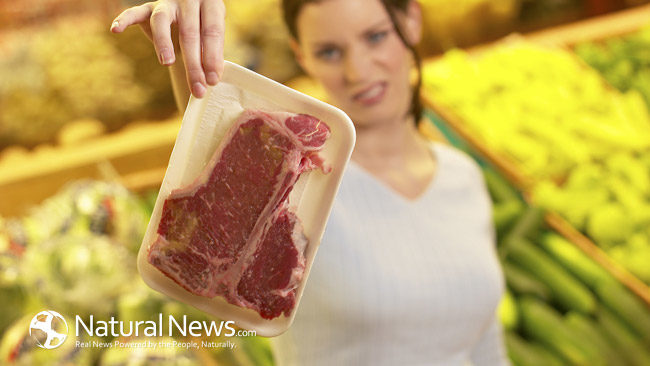This is the time of year when most of us are making new year’s resolutions, or at least trying to. Topping our resolution lists year after year are promises to “eat better”, “get healthier”, and “lose weight”. What if you could make just one simple lifestyle change that would accomplish all of that, plus reduce animal suffering and help the environment? Consider reducing the amount of meat you eat – it’s that simple! There are three key benefits that are repeatedly cited by those who choose to reduce or eliminate meat’s place in their diet.
- You will experience better health and lose weight. Depending on the amount and type of meat you consume, most people report significant weight loss and improved health upon reducing or giving it up. Those that reduce or eliminate meat from their diets tend to naturally consume fewer calories, and less fat, than their meat heavy counterparts. Red and processed meats, specifically, are said to be the biggest culprit when it comes to fat intake and health risks. Studies have shown that eliminating or drastically reducing red and processed meat can reduce your risk of developing certain cancers and heart disease. Of course, it should be stated, that giving up meat for junk food and sugar will not necessarily help you on your way to weight loss and better health. Meat should be replaced with healthy whole food alternatives such as fruits and vegetables, or whole grains. If you’re concerned that you won’t get enough protein by reducing meat in your diet, consider that the average person gets far more protein from their daily diet than they typically need. There are many great plant based protein sources, and even “faux meat” products that are made from plant based protein sources (soy, rice, and pea are common), that are so close to the “real thing” that many people don’t miss meat at all. If you adopt the “flexitarian” approach to reducing (instead of eliminating) your meat intake, you can also rely on eggs, dairy, and occasional fish or poultry to ensure adequate protein levels.
- The animals will thank you. Factory farming has made headlines in recent years due to the inhumane treatment that the animals confined to these operations endure. From overcrowding in unsanitary conditions, to untreated injuries and disease, to outright physical abuse at the hands of workers, animals farmed for food suffer far more than many of us can (or would like to) imagine. Most of us really don’t know where the meat on our plates came from, and it’s an eye opening experience once we find out. Even the most avid meat eaters among us would probably agree that preventable suffering is not a necessary part of the process involved in getting that meal to your plate. When it is standard practice to castrate baby pigs with no anesthesia (some die from untreated infections afterwards), confine their mothers to “gestation crates” that force them to spend their entire lives unable to move or turn around, and grind up male chicks while they are still alive, there is clearly a problem that needs to be addressed. If you choose to reduce your meat intake, instead of eliminating it completely, consider spending a little more to buy humanely farmed meats, preferably from a local farmer who would love your support, and would probably be more than happy to discuss how their animals are treated with you.
- The environment will thank you too. Industrial animal agriculture has devastating environmental impacts. Livestock covers 45% of the earth’s total land. Animal agriculture is the leading cause of species extinction, ocean dead zones, water pollution, and habitat destruction, and it is single handedly responsible for up to 90% of Amazon rainforest destruction. It uses tremendous resources, totaling 55% of U.S. water consumption alone. For reference, all private households in the U.S. combined only make up 5% of U.S. water consumption. Animal agriculture is also responsible for more greenhouse gas emissions than all transportation combined, and 80% of all antibiotics sold in the U.S. are sold for animal agriculture use. It’s shocking to think that 1.5 acres of land can produce only 375 pounds of meat, while the same amount of land can produce 37,000 pounds of plant based food in the same time frame. These figures are startling, and may seem inflated, but these are not numbers coming from activist organizations with an agenda. These figures come from reports published by organizations such as the CDC, USDA, EPA, World Bank, and various academic institutions.
What we eat is a very personal choice, and everyone needs to do what’s right for them, but if you think that you could benefit from reducing or eliminating the meat in your diet, give it a shot! You don’t have to go “cold turkey” – try making one day per week (or even one meal per day) meatless and see how it goes. You might find that the change is easier than you thought it would be, and even a little can make a difference. If everyone in the U.S. alone went vegetarian for just one meal per week, it would have the same environmental impact as taking more than half of a million cars off roadways. Every little bit counts!





